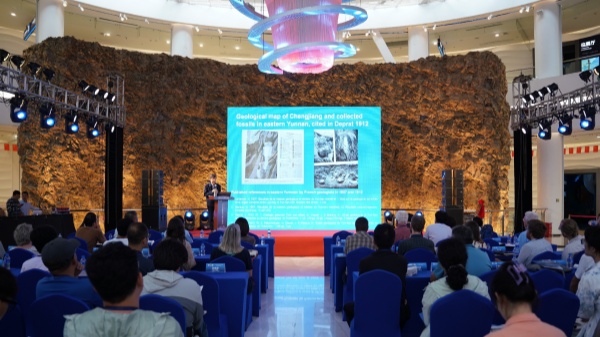YNU marks 40th anniversary of unique Chengjiang fossil find
Yunnan University, or YNU – located in Kunming, capital of Southwest China's Yunnan province – recently celebrated the 40th anniversary of the discovery of the Chengjiang Biota, widely rated the most diverse assemblage of rare marine Cambrian fossils ever known to man.
Biota is a fossil repository of animal and plant life of a particular region, habitat, or geological period and the 40th Anniversary of the Discovery of the Chengjiang Biota-International Paleontology Forum was held in Chengjiang city, Yunnan province, on July 3-6.
Hou Xianguang – the discoverer of the Chengjiang Biota and a pioneer in paleontological research at Yunnan University – delivered the keynote speech.
The forum aimed in its words to "highlight the academic value of the Chengjiang Biota and promote the development of paleontology in China", with YNU's Institute of Paleontology as one of the co-organizers.

Yunnan University jointly holds the 40th anniversary event of the Discovery of Chengjiang Biota. [Photo/ynu.edu.cn]
Attending the landmark event were paleontology experts and scholars from Harvard University, Oxford University, Yunnan University and the Nanjing Institute of Geology and Paleontology at the Chinese Academy of Sciences, among others.
In his speech, Hou Xianguang recounted the discovery process of the Chengjiang Biota and explained its academic status and scientific significance from a global paleontological research perspective.
He also comprehensively reviewed the research history and latest progress of the Chengjiang Biota.
During the event, participating scholars also gave presentations on various themes such as Early Life Evolution – showcasing the achievements of researchers in the field of early Cambrian life evolution in recent years.
The Chengjiang Biota was discovered on July 1 in 1984 and was inscribed on the UNESCO World Heritage List on July 1, 2012 – thereby becoming China's first and Asia's only fossil site to be listed as a World Natural Heritage item.
Over the past 40 years, research by scientists has reported over 20 phyla – the biological classification rank at the level below kingdom and above class – and more than 300 species within the biota.
The fossil record of the Chengjiang Biota is said to vividly recreate the magnificent scenes of Cambrian marine life and the primitive characteristics of early metazoans – providing invaluable evidence for studying the origin, evolution and ecology of early life on Earth.
All rights reserved. Presented by China Daily. 滇ICP备12004993号-2








